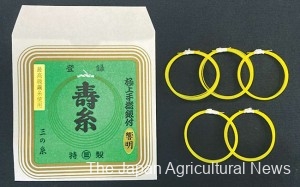| SHIGA, Aug. 6 – Japan’s National Agriculture and Food Research Organization (NARO) and Marusan Hashimoto Co. (Nagahama City, Shiga Prefecture), a Japanese silken thread manufacturer, announced on August 5 a successful joint development of new highly-durable strings for shamisen, a traditional Japanese instrument similar to a banjo. The newly-developed strings feature silken threads from cocoons of a new silkworm strain “Kyomei,” a strain known for producing high-strength silken threads. Instrument strings made from silk produce beautiful sounds and resonate well. However, they are weaker and easier to break than resin strings, which are more commonly used. NARO and the thread maker plan to expand the use of silk strings to other instruments, including the koto, another traditional Japanese instrument.
They developed the third string for the three-string traditional musical instrument, the thinnest and weakest. In tests to measure how many plucks it can withstand, it was found to be over 30% more durable than existing silk strings. Also, in sensory tests by professional shamisen players, it was found that the string does not fray easily and produces more prominent sounds and more excellent resonance. NARO developed Kyomei, a silkworm that makes stronger and longer silken threads, by crossing J137 and MC502 silkworm strains. “In addition to existing silk products, we can also develop new products taking advantage of the high strength of this material,” a person from the Institute of Agrobiological Sciences of NARO said. |


